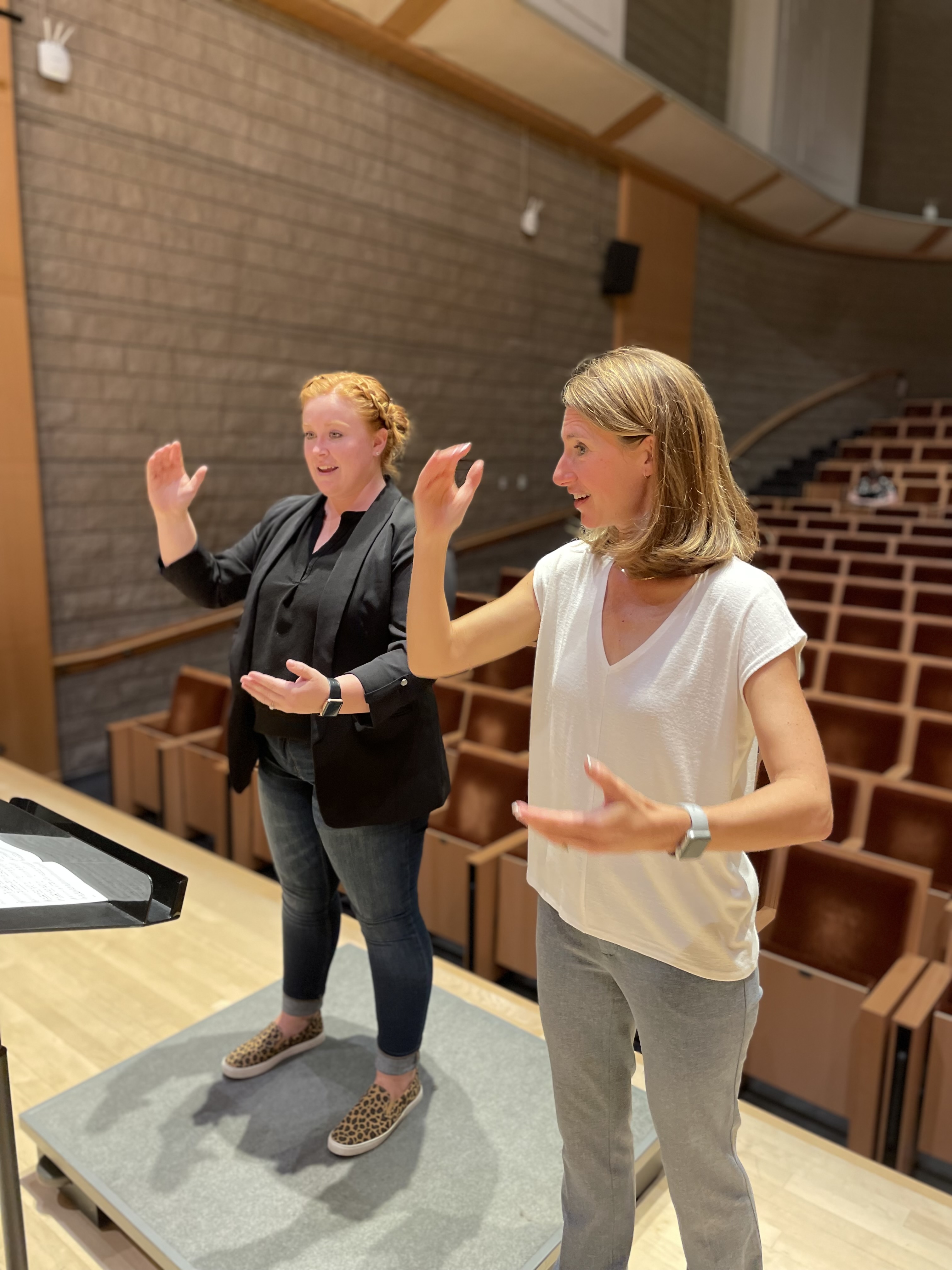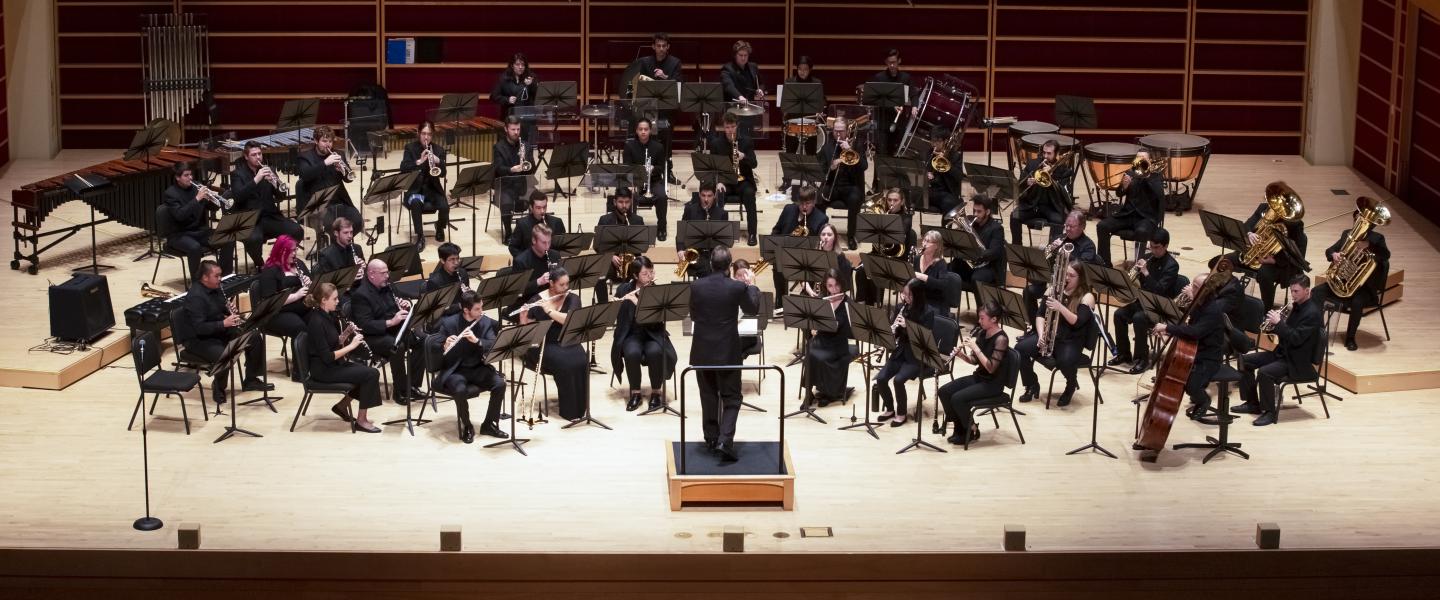Mission
The mission of the Department of Music is to teach music students of varying backgrounds and career aspirations the skills, knowledge and perspectives that will enable them to pursue productive lives as performers, scholars, educators and life-long appreciators of music.
The Department embraces the needs, aspirations and unique potential of each individual student by providing a well-rounded curriculum that comprises a broad spectrum of musical styles and applications.
Student performances and faculty professional activity provide cultural and educational resources to the campus, the community, and beyond.
Objectives
The Department of Music is guided by seven fundamental goals and objectives. These goals are the driving force behind all of our curricular planning, operational decisions and artistic endeavors. The Music faculty's active participation in formulating this vision has served to renew the founding values that have guided the department since its inception.
1. To provide every undergraduate Music major with a broad range of performance experiences, applicable theoretical and musicianship skills, and an understanding and appreciation for music drawn from diverse historical, geographic and cultural settings.
Despite the dynamic cultural forces at play in our rapidly changing, technology-driven world, the Music Department faculty believes that there exists a coherent core of knowledge, skills and experience which should be shared by all our music students. All majors share a basic curriculum consisting of theory work (harmony, form and analysis) and its applied use in the broader spectrum of literature; ear training; keyboard skills; historical surveys covering a broad range of musical literature; intensive study of music history; and participation in one major performing ensemble during each semester of residence in which the student plays their declared performance medium (instrument or voice).
As a condition to declaring the Music major, prospective majors in all concentrations (Applied, Jazz Studies, Liberal Arts and Music Education(Pre-Certification)) are required to audition. The content requirements for that audition differ for each concentration, but all applicants must perform two major scales, one minor scale (all three forms: natural, harmonic and melodic) and two contrasting movements of music (solo or unaccompanied).
Preparatory (remedial) courses are provided for prospective majors admitted to the university but not initially accepted into one of the four music concentrations as a major. Completion of one or more of these preparatory courses usually results in the student's admission to the major at the lower division level (usually in the fall semester of the second year of study).
All music majors are expected to take studio instruction in their performing medium in accordance with their particular concentration (Applied, Jazz Studies, Liberal Arts and Music Education (Pre-Certification)). In addition, all students are required to register for the corresponding Repertoire Class or Forum Class.
2. To provide a broad-based liberal arts music major which allows for a wide range of options for further musical study and training.
The Liberal Arts Music concentration offers students a continuation of the broad-based core curriculum described above. There is, however, some flexibility in the choice of specific courses. Most students follow the pattern of courses set forth in the catalog. Those with clear career or study objectives are free to propose a continuation that differs from the catalog pattern if (a) they can convincingly design a pattern that better serves their objectives, and (b) they petition a committee of the faculty for approval prior to embarking on the modified curriculum.
3. To offer students with more specific career objectives in jazz, composition, vocal, instrumental or music theatre performance, world music studies or music education the alternative of pursing those objectives through specialized programs which build on the Department's core courses.
The Jazz Studies concentration is designed for students whose primary interest is performing in or composing for jazz bands. Emphasis is placed on both performing and arranging in a wide variety of post-swing band idioms.
The Applied concentration is open to students with clear professional potential as performers, composers or musicologists. Acceptance into this concentration requires a recommendation by the student's applied instructor and a formal audition. At the conclusion of their first two years of study at the lower division level (or upon entry to the University at the upper division level), Applied majors are required to pass a Sophomore jury examination as a condition to continuing (or, in the case of transfer students, entering for the first time) as Applied majors in the upper division.
The Music Education (Pre-Certification) concentration prepares students for teaching music in grades K-12. Acceptance into this concentration requires an interview with a faculty committee and demonstration of appropriate applied music skills.
While by no means a conservatory, the Department recognizes that a high percentage of its graduates aspire to a professional career in the musical field. While a healthy percentage of those graduates will seek further training in graduate or professional schools, it also recognizes that its undergraduate curriculum will serve as the final formal education for many others. It takes very seriously its responsibility to prepare and equip all of its students with the tangible skills, realistic expectations and practical strategies that will maximize their chances of negotiating successfully their next steps after graduation into what is without question a highly competitive field. Though the Department continues to share the university's primary commitment to a broad-based liberal arts approach to higher learning, it takes very seriously its responsibility to equip its students for success as productive, fulfilled, working artists and vital agents in the real world.
Though Sonoma State University remains technically in that category of institutions offering a Liberal Arts Degree (B.A.) with a Major in Music, we consider ourselves meeting in selected areas (Performance, Jazz Studio and Music Education (Pre-Certification) especially) the standards of programs offering Professional Baccalaureate Degrees in Music and have made the conscious decision to apply those higher professional program (B.M.) standards to those selected areas in this self-study process.
4. To provide students with a basis for career flexibility.
Music students are urged to complete a pattern of both music and elective courses that allows for various career continuations. Emphasis is placed on the development of strong oral and written communication skills in addition to skills specific to the area of special interest.
As an extension of its commitment to addressing the unique goals and interests of the individual student, the Music Department, often in collaboration with the Director of Interdisciplinary Studies, encourages students having focused music-related interests outside or beyond the scope of its existing concentrations to design and pursue customized courses of study with the assistance and close supervision of a music faculty advisor. Such "independent" study plans are most frequently structured through either the Liberal Arts Music concentration or (when music study comprises only a part of a broader interdisciplinary focus) the university Office of Interdisciplinary Studies.
The explosion of music and multi-media computer technology continues to provide students with opportunities and career options that were beyond the imagination and economic grasp of most students only a decade ago. The Department's commitment to technology-related studies in general has not waned.
5. To provide a broad cross-section of courses for the general student.
The Department regards the offering of appropriate General Education courses for non-majors as a primary objective. We offer both lower and upper division courses for such students: a general introductory survey to music the world over, a survey of Western art music, a survey of music in the United States, a survey of world music, and topics courses in musical genres and specific composers.
All Department courses (except individual applied music instruction, which is limited to music majors) are available to any qualified student. Non-majors and non-matriculated students from the community are also welcome in many of our performing ensembles.
6. To contribute to the cultural enrichment of both university students and members of the surrounding community.
Music Department students and faculty present a varied roster (140+ performances) of musical events each season—both on campus and in the community. In addition to recitals and ensemble concerts supported largely by Instruction-Related Activity student fees, the Evert B. Person Performing Arts endowment supplements the state-supported curriculum with a number of special workshops and guest artists residencies throughout the academic year. Community members can register for most departmental classes through the Open University on a space available basis.
All these objectives are consistent with, and supportive of, the mission of Sonoma State University and its new performing arts complex and forum for arts and ideas, the Donald and Maureen Green Music Center.
7. To support and encourage the faculty in their creative endeavors and in their scholarly activities.
In addition to preparing the Department's wide array of student recitals and ensemble performances (choral, jazz, classical winds, opera and music theatre, world music, new works, etc.), the faculty present frequently recitals of their own and actively participate in national and international conferences, in research, and in creative projects both on and off campus.
Many faculty (part-time and full-time) serve in part-time musical roles off-campus, often as music directors of community or regional ensembles, as "gigging" musicians, as leaders or advisors to arts organizations, or as teachers to community populations.


